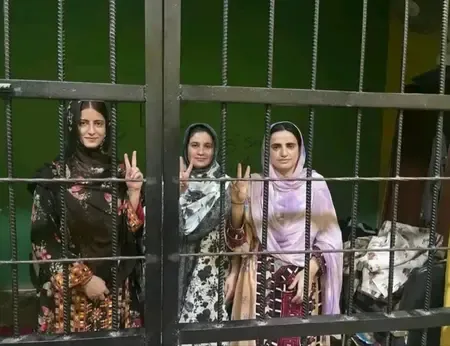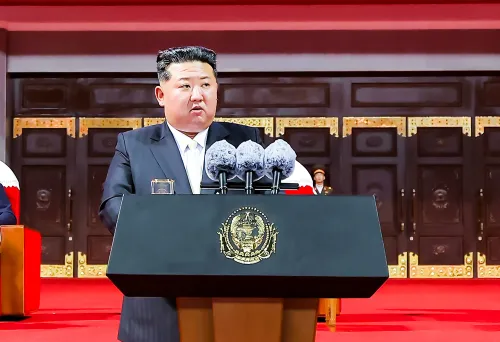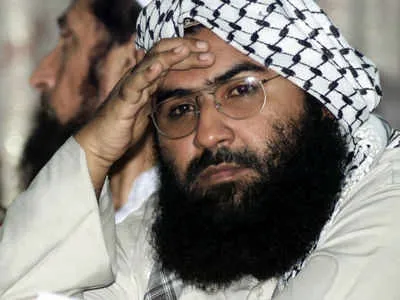Does the Gopalganj Violence Expose the Dark Side of Bangladesh's New Political Order?

Synopsis
Key Takeaways
- Violence in Gopalganj highlights political turmoil.
- Interim government struggles to maintain order.
- National Citizen's Party emerges as a significant force.
- Concerns over the erasure of historical legacies.
- International community criticizes the ban on Awami League.
Dhaka: The political landscape in Bangladesh has long been vibrant, yet often overshadowed by instances of violence that seem almost woven into its history. Following the ousting of Sheikh Hasina in August of the previous year, the nation has spiraled into a phase of unrest, with chaos filling the streets and ordinary citizens suffering from escalating insecurity. The interim government, while expressing a desire to restore stability, appears either unable or perhaps reluctant to control this burgeoning disorder.
With the Awami League now banned and absent from the political arena, a void has emerged — one that has not led to stability. Instead, political rivalries have intensified. Formerly united against the League, various parties are turning on each other, competing for influence in an increasingly splintered environment. Among them, the National Citizen's Party (NCP), born from the fervor of last July's student protests, has risen as a significant and provocative entity. Its rapid ascent has heightened tensions in a country still dealing with the aftereffects of its former ruling party's dominance.
The events in Gopalganj on July 16 vividly highlighted the troubling aspects of this new political landscape. The NCP's ambitious nationwide initiative, dubbed 'March to Build the Country,' was intended to commemorate the first anniversary of the July Uprising. However, what started as a rally aimed at showcasing unity quickly escalated into violence as NCP members clashed with factions of the banned Bangladesh Chhatra League — once affiliated with the Awami League. Reports confirmed the use of crude explosives, resulting in five deaths and over 50 injuries. While the Awami League may be officially disbanded, its grassroots influence and legacy remain evident.
Alarmingly, this confrontation exposed the NCP's own drift towards authoritarian behavior. A party that previously condemned the Awami League and its supporters as 'fascists' is now exhibiting the very traits it once criticized. The violence in Gopalganj — a town historically linked to Sheikh Mujibur Rahman — was no coincidence. The NCP's provocative decision to hold their rally there, perceived by many as an intentional act to tarnish Mujib's legacy, has raised concerns about a coordinated effort to erase the historical and ideological foundations of Bangladesh itself.
In recent months, the NCP has positioned itself at the forefront of national discourse, advocating for three main objectives: the permanent prohibition of the Awami League, the completion of the July Uprising trial, and the formal adoption of the July Charter as a foundational document. Initially, the interim government resisted these demands. The Chief Advisor had even stated that it was the Awami League's choice whether to participate in elections. However, following the NCP's demonstration in Dhaka in May, the government's stance shifted. On May 12, the League's registration was revoked by the Election Commission, and all its political activities were suspended pending the outcome of the July trials.
The international community reacted negatively to this decision. Numerous global observers criticized it as a deviation from democratic principles. The ban on the nation's oldest and arguably most historically significant political party has raised concerns about the interim government's impartiality and the future of pluralistic politics in Bangladesh.
While the NCP brands the Awami League as fascist, it is becoming increasingly clear that the new party embodies its own ideological extremism. The assault on Mujibism is no longer just rhetorical. There is a deliberate campaign underway to erase the legacy of Sheikh Mujibur Rahman — Bangabandhu, the Father of the Nation — from public consciousness. Following Hasina's removal, state-led actions have prompted the removal of his portraits, the cancellation of holidays celebrating his contributions, the renaming of institutions, the rewriting of textbooks, and even the demolition of historical sites tied to him.
The transformation extends beyond politics. It encompasses a cultural shift aimed at redefining the ideological landscape of the nation. The existing Constitution, established in 1972 with secular and nationalist principles stemming from the Liberation War, has come under fire. The NCP, supported by Islamist factions, has denounced it as a 'Mujibbadi' document and has called for the eradication of its core tenets. This demand directly challenges the essence of Bangladesh's struggle for independence and its nation-building efforts.
The interim government's complicity cannot be overlooked. Rather than serving as a neutral guardian of national stability, it has quietly facilitated these actions. The symbolic obliteration of Mujib's legacy is starkly visible in the demolition of sites like Mirza Alam Chattar in Jamalpur and the Bangabandhu memorial in Jessore — both being replaced with monuments commemorating the July Uprising. These actions have sparked significant backlash, with citizens, historians, and civil society leaders warning against rewriting history to fit the narrative of a single political faction.
Nowhere is this more evident than in Gopalganj, the birthplace and final resting place of Sheikh Mujibur Rahman.
The NCP's decision to host a rally there was broadly viewed as incendiary. Eyewitness accounts and media reports indicate that NCP members, some armed, unleashed violence upon civilians — allegedly with the backing of military personnel assigned to maintain order. The Bangladesh Army's involvement in this crackdown raises serious questions about its neutrality. The UK-based International Crime Research Foundation has called for a UN-led investigation into what it describes as a "premeditated assault" on the mausoleum of Bangladesh's founding father.
The interim government's silence in the aftermath of the Gopalganj incident speaks volumes. Many perceive it as tacit approval of the NCP's radical agenda. Nahid Islam, the NCP's convenor, has made increasingly provocative statements since the event — referring to Gopalganj as a "fascist stronghold" and even claiming that Ziaur Rahman, not Mujib, was the true proclaimer of Bangladesh's independence. Such statements not only distort historical realities but also aim to reshape the collective memory of the nation.
Ultimately, the political violence in today's Bangladesh is not merely a consequence of power struggles. It is deeply entwined with a concerted effort to dismantle Sheikh Mujib's ideological legacy. The NCP's insistence on an Awami League-free Bangladesh undermines the principles of inclusive democracy. Regardless of the negative perceptions surrounding a party, true democratic practice necessitates the inclusion of all voices — including those that dissent or are unpopular.
The Gopalganj tragedy has unveiled a harsh reality: in striving to eliminate one form of political hegemony, Bangladesh risks slipping into another — this time cloaked in the guise of revolutionary justice and popular sentiment. Such a trajectory endangers not only the stability of the state but also the ethical compass of its political landscape. Erasing history, however flawed, offers no pathway to genuine reform.
In contemporary Bangladesh, the distinctions between victim and aggressor, fascist and liberator, are increasingly blurred. If the nation hopes to emerge from this period of polarization and purges, it must reaffirm its commitment to truth, reconciliation, and political pluralism — before another chapter of its history is inscribed in blood.









